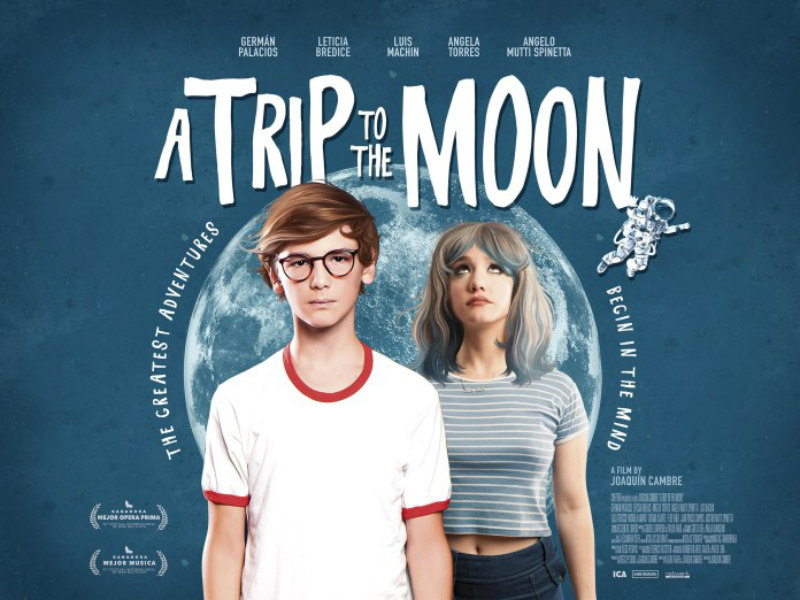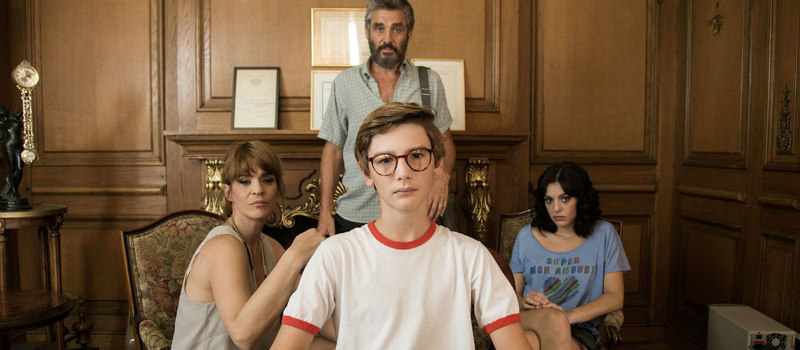
Review by Benjamin Poole
Directed by: Joaquín Cambre
Starring: Ángelo Mutti Spinetta, Leticia Brédice, Germán Palacios, Ángela Torres, Luca Tedesco

From the Argentinian motherland of Magical Realism, A Trip to the Moon is a sumptuous delight which honours its home-grown genre. Joaquín Cambre’s bildungsroman opens with a sequence of a lad riding his bike up and down the empty depths of a disused municipal swimming pool; the sort of play which you can only indulge in at a certain age, and, at the threshold age of 13-ish, probably something that our central character Tomas won’t be able to do for much longer, either. The specifically Ballardian image is an early nod to A Trip to the Moon’s figurative and thoughtful approach, suggesting that Tomas (Angelo Mutti Spinetta) lives in an inner-city world that is increasingly aloof and, well, empty. The anonymous glass and steel of Buenos Aires’ tower blocks stretch to block out the blue sky, and, in an early bravura incident of A Trip to the Moon’s cinematic expressionism, Tomas blissfully weaves his bike home through half a mile of traffic at stand still, signifying the stagnancy of the adult world and the contrasting, carefree unawareness of being a boy.

From the point of view of its nerdy, awkward lead, we are introduced to Tomas’ life: his mother is something of a lush, her fella a lech, and his sister is just that bit older and so already experiencing the dubious pleasures of adolescent relationships and alcohol. To confound matters, poor old Tomas is on anti-psychotic medication, probably due to the car accident involving his father and himself which the story refers to in elliptical flashback. It’s grim, but, in an approach which almost every single British film I have reviewed this year could do with understanding, as a child Tomas doesn’t realise this, and sees the world through blissful innocence. A Trip to the Moon is so beautiful. Perhaps the air is different in Argentina, because A Trip to the Moon’s mise-en-scene bursts with colour, making the magnolia of Tomas’ cramped family apartment the shade of clotted cream, the ham in his uninspired tea the perfect pink blush of a petal. This is the lush spectrum of childhood, a revolving kaleidoscope of imagination which the film spins about us.

Of course, it cannot last. Nothing does, least of all youth. And Tomas, who obsesses over space travel in that romantic way we all did when we were kids, will soon be forced to put away his childish things - the posters of Apollo 11, the toy rockets - and meet the adult orthodoxy of desperate sex and habitual drinking that his parents subsist upon. In a telling sequence typical of Cambre’s visual storytelling, we see Tomas gazing out of the window through his telescope at a screen filling silver moon, but his telescope droops (the camera tilting in one fluid drop) and accidentally settles upon the bedroom window of a sexy girl in a bra (Susi, played by Leticia Bredice: Ariana Grande’s Eurotrash cousin) who is shining a torch back at him in order to command his attention: a perfect symbolisation of what happens to every boy during puberty, when their perspective and interests narrow painfully to solitary and all-encompassing fascination.
It is as if the telescope is reversed: looking through it correctly the world is open with possibility and incredible detail, yet vice-versa the view is shrunk to a tight, unforgiving pinpoint. Correspondingly, A Trip to the Moon's narrative does the same: as the film continues, Tomas’ world recedes to a concentrated outlook, causing his imagination to kick in and attempt to overwrite his reality. What opens innocently like the best ever made for television CITV film becomes a poignant meditation upon circumstance: social realism meets magical realism. The spectre of sex - strange, weird and undignified at that age - encroaches upon the frame, with glimpses of Tomas’ sister getting off with her boyfriend, the queasy jealousy of Tomas’ mum when his step father checks out his step daughter, the indecent, hypnotic swing of his mother’s breasts barely contained within a cheap vest. Tomas is not ready for such squalor, but it’s tough shit kid, as the lad inevitably finds himself increasingly doting on Susi, leading to obsessive, delusional behaviour.

In the last act of the film, A Trip to the Moon swerves fully into the fantastical realms of magic realism, a genre that uses the limitless expressions of artifice to express genuine emotion, as Tomas achieves his vaunted ‘trip’ in a bittersweet denouement. For some audiences A Trip to the Moon may be twee and too cutesy in that irritating Wes Anderson way (although Anderson never had the hardened core which Cambre achieves here), and it may run out of energy at certain points too, but nonetheless there is real excitement and vision to be found here in a magical-social-realism film which shines with the pastel shade of memory, and is perfumed by the sweet sherbet moon dust of childhood.

A Trip to the Moon is in UK cinemas March 22nd.

